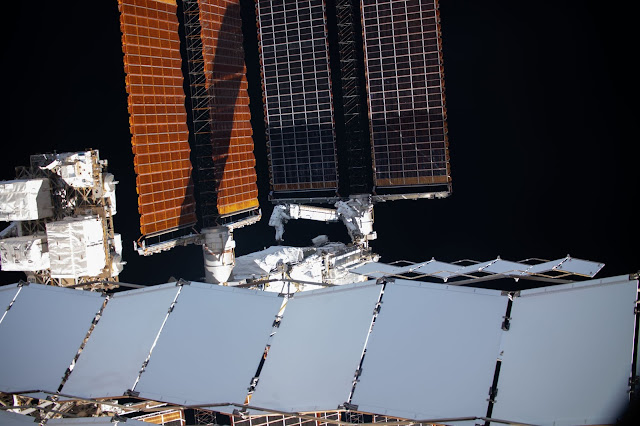ISS - Expedition 65 Mission patch.
June 24, 2021
Four Expedition 65 crew members spent Thursday preparing for the third spacewalk to continue new roll-out solar array installation work. The other three International Space Station crew members continued with variety of space research.
Astronauts Shane Kimbrough and Thomas Pesquet are scheduled to exit the space station shortly after they set their U.S. spacesuits to battery power at 8 a.m. EDT on Friday. The veteran spacewalking duo will work about 6.5 hours to begin installing a second ISS Roll-Out Solar Array (iROSA) on the station’s Port-6 truss structure.
Image above: (Clockwise from bottom) Expedition 65 Flight Engineers Mark Vande Hei, Megan McArthur, Shane Kimbrough and Thomas Pesquet participate in robotics training to support the solar array installation spacewalks. Image Credit: NASA.
Both astronauts set up their spacesuits then readied their tools inside the U.S. Quest airlock just before lunchtime today. Afterward, they joined NASA Flight Engineers Megan McArthur and Mark Vande Hei and reviewed the procedures and robotics activities planned for Friday’s excursion. NASA TV will begin its live spacewalk coverage at 6:30 a.m. on both the agency’s website and the NASA app.
Image above: NASA astronaut Shane Kimbrough (left) and ESA (European Space Agency) astronaut Thomas Pesquet maneuver the first ISS Roll-Out Solar Array (iROSA) into place on the space station’s port 6 truss structure during a spacewalk June 16, 2021. Image Credit: NASA.
Commander Akihiko Hoshide started his day swapping samples inside the Materials Science Laboratory. Those samples, such as metals, polymers and alloys, are exposed to high temperatures possibly leading to new applications or new materials on Earth and in space. The three-time station visitor also investigated how microgravity affects bacteria and ways to counteract harmful changes for the Oral Biofilms experiment.
Astronaut spacewalk. Animation Credit: NASA
In the Russian segment of the orbiting lab, Roscosmos Flight Engineers Oleg Novitskiy and Pyotr Dubrov partnered together and explored how long-term spaceflight impacts the blood circulation system. Novitskiy later worked in the Columbus laboratory module trapping clouds of particles for a plasma crystal experiment. Dubrov also researched piloting techniques that astronauts might use to maneuver future spacecraft and robots on planetary surfaces.
Related article:
NASA to Air Launch, Docking of Roscosmos Cargo Ship to Space Station
https://www.nasa.gov/press-release/nasa-to-air-launch-docking-of-roscosmos-cargo-ship-to-space-station
Related links:
NASA TV: https://www.nasa.gov/nasalive
Expedition 65: https://www.nasa.gov/mission_pages/station/expeditions/expedition65/index.html
ISS Roll-Out Solar Array (iROSA): https://www.nasa.gov/feature/new-solar-arrays-to-power-nasa-s-international-space-station-research
Port-6 truss structure: https://www.nasa.gov/mission_pages/station/structure/elements/truss-structure
U.S. Quest airlock: https://www.nasa.gov/mission_pages/station/structure/elements/joint-quest-airlock
Materials Science Laboratory: https://www.nasa.gov/mission_pages/station/research/experiments/explorer/Facility.html?#id=1854
Oral Biofilms: https://www.nasa.gov/mission_pages/station/research/experiments/explorer/Investigation.html?#id=8160
Blood circulation system: https://www.energia.ru/en/iss/researches/human/11.html
Columbus laboratory module: https://www.nasa.gov/mission_pages/station/structure/elements/europe-columbus-laboratory
Piloting techniques: https://www.energia.ru/en/iss/researches/human/24.html
Space Station Research and Technology: https://www.nasa.gov/mission_pages/station/research/overview.html
International Space Station (ISS): https://www.nasa.gov/mission_pages/station/main/index.html
Images (mentioned), Animation (mentioned), Text, Credits: NASA/Mark Garcia.
Greetings, Orbiter.ch




